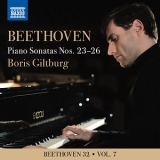 Beethoven 32, Vol. 7; Ludwig van Beethoven: Klaviersonaten Nr. 23, op. 57 (Appassionata) & Nr. 24, op. 78 & Nr. 25 op. 79 & Nr. 26 op. 81a (Les Adieux); Boris Giltburg, Klavier; 1 CD Naxos 9.70313; Aufnahmen 07 & 00/2020, Veröffentlichung 01/2021 (61'23) – Rezension von Remy Franck
Beethoven 32, Vol. 7; Ludwig van Beethoven: Klaviersonaten Nr. 23, op. 57 (Appassionata) & Nr. 24, op. 78 & Nr. 25 op. 79 & Nr. 26 op. 81a (Les Adieux); Boris Giltburg, Klavier; 1 CD Naxos 9.70313; Aufnahmen 07 & 00/2020, Veröffentlichung 01/2021 (61'23) – Rezension von Remy Franck

Die Ohren hat man bei Giltburgs Beethoven-Interpretationen immer auf. Im ersten Satz der Appassionata öffnen sich aber auch Mund und Augen, um alles aufzunehmen und zu bestaunen, was pianistisch geschieht. Die Rubati, die Crescendi, die Decrescendi, die Akzente, die Explosionen, die Eskapaden der rechten Hand, all das ist atemberaubend und elektrisierend. In dieser Interpretation hat die Appassionata ihren Titel voll verdient. Das bedeutungsvolle Andante, der heftige Übergang zum letzten Satz und der wilde Ritt in eben jenem Satz sind ebenso fesselnd wie gewagt. An Giltburgs Appassionata werden sich die Geister scheiden, von abgeneigt bis fasziniert. Wenn Sie zustimmen, ist es schwer, der Energie zu widerstehen.
Nachdem Beethoven sich in der 23. Sonate so sehr verausgabt hatte – denn, ja, was Giltburg spielt, wurde auch geschrieben – sind die beiden Sonaten Nr. 24 und 25 recht kurz, aber dennoch nicht substanzlos oder leicht, und Giltburg spielt sie rhetorisch genug, um die Musik nach der Appassionata nicht bedeutungslos werden zu lassen.
In der Sonate Les Adieux ist sein Spiel energisch, robust, kantig und scharf in den Ecksätzen und eher weich und zart im Andante. Während der gesamten Sonate bietet er eine große Bandbreite an Emotionen.
Aufs Ganze gesehen sind dies Giltburgs bisher radikalste und am schärfsten formulierte Beethoven-Interpretationen. Sind sie vielleicht eine Reaktion inmitten der Pandemie?
One’s ears are always open in Giltburg’s Beethoven interpretations. In the first movement of the Appassionata, however, mouth and eyes also open to take in and marvel at all that happens pianistically. The rubati, the crescendi, the decrescendi, the accents, the explosions, the escapades of the right hand, all this is breathtaking and electrifying. In this interpretation, the Appassionata fully deserves its title. The meaningful Andante, the violent transition to the last movement, and the wild ride in that very movement are as riveting as they are daring. Giltburg’s Appassionata will divide opinion, from averse to intrigued. If you agree, it’s hard to resist the energy.
After Beethoven had expended himself so much in the 23rd Sonata – because, yes, what Giltburg plays was written – the two sonatas Nos. 24 and 25 are quite short, but still nothing unsubstantial or easy-going, and Giltburg plays them rhetorically enough not to let the music become meaningless after the Appassionata.
His performance of Les Adieux is energetic, robust, angular and sharp in the outer movements and rather soft and tender in the Andante. During the entire sonata he offers a wide range of emotions.
Overall, these are Giltburg’s most radical and sharply formulated Beethoven interpretations so far. Are they perhaps a reaction in the midst of the pandemic?
























